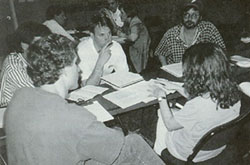Volume 29, Number 5 September/October 1998
SPECIAL FOCUSEarly Citizen Involvement: Vital for Effective PlanningThe DuPage River Coalition is an excellent example of citizens mobilized to plan for the future of their community By Anne Marie Smith and Brook McDonald
Over the past ten years, citizen volunteers have initiated, maintained and enhanced various river and watershed protection programs. The most recent accomplishment of the DRC is the development of a watershed plan for the upper DuPage River watersheds (east and west branches in DuPage County). Again, citizen involvement has been a key element in this planning process. Phase I of the watershed planning process was completed in 1997 and involved determining goals and recommendations. This phase was completed solely by local citizens and landowners because they are able to suggest ideas without financial constraints and political obligations. The first step was to ensure all the citizens were adequately informed and knowledgeable of the DuPage River watershed and its ecological health. The initial meetings involved the presentation of information through written materials and speakers. This information prompted a great deal of discussion about watershed problems and issues. Once everyone was at approximately the same information level, these citizens were asked to list their ideas about what needed to be done to restore and protect the upper DuPage River watershed. After some combining, these numerous ideas were reduce to 26, 10 of which were prioritized by citizens using an adapted nominal group process. (The remaining 16 ideas will be addressed at a later time.) These top 10 ideas were grouped into five categories: Ecosystems, Education, Land-Use, River Access, and Water Quality. A team of citizens was formed for each of these five categories to write a concern statement and edit the initial ideas into recommendations including suggested action items. This is the document that was forwarded on to Phase II: the development of an implementation plan including action items, time lines and budgets. This second phase is being completed primarily by technical professionals and municipality/ park district representatives, but also includes some of the local citizens involved in Phase I. It is important to acknowledge the importance of starting with citizen involvement for direction. The citizens, stakeholders living within the watershed, expressed their vision and prioritized what needed to be done. However, it is the local officials and government agencies that must implement these ideas. The final document will include the vision, concern statements and recommendations provided by the citizens, and the implementation plan provided by the technical people and government officials. This final document will be presented at a DuPage River Summit in winter of 1999. The final task of implementing the plan will require the efforts of citizens, local government, non-profits and others to work in a partnership fashion. For example, local government will be asked to strengthen their water quality and zoning ordinances, and the local forest preserve and park districts will be asked to provide increased access points for recreational users of the river. All partners, including non-profit organizations, will be asked to initiate or continue various educational and informational programs. Many of the DRC's programs will be a part of the plan's implementation, particularly in the areas of education and water quality. These programs are dependent upon citizen volunteers and include the following.
32 | Illinois Parks and Recreation
Traditionally, government entities have developed watershed and other master plans which only involved the public after the research, goals and recommendations had been developed. In the past, government asked citizens to "comment" on their plans after much time and money had already been expended on developing the "draft plan." In this innovated watershed planning process, the citizens start the process off by conducting the necessary research and developing their own vision, goals and recommendations. Only after the citizens have set the pace and direction, do the technical professionals and government agencies come into the process. They are charged with the responsibility of determining how to implement the vision of the citizens. This new process is in reverse of traditional government planning models, and can be adapted to any planning process (even park master plans).
Protecting our watersheds is in everyone's interest and must involve citizens,
as well as government agencies, non-profit organizations and others.
However, it is citizens who provide the necessary level of creativity and
political freedom vital to changes in policy and attitudes. The true power of
democracy is in its citizenry. ž |
September / October 1998 | 33
 The DuPage River Coalition (DRC) began in 1989 as a grassroots citizen group under the umbrella of The Conservation Foundation, a non-profit land trust located in Naperville. The mission of the DRC is "to increase awareness of the DuPage River watershed in those who live in it and improve the river's water quality through the active involvement of the community."
The DuPage River Coalition (DRC) began in 1989 as a grassroots citizen group under the umbrella of The Conservation Foundation, a non-profit land trust located in Naperville. The mission of the DRC is "to increase awareness of the DuPage River watershed in those who live in it and improve the river's water quality through the active involvement of the community."